驅邪
We are reissuing A Monkey King’s Journey to the East on 1 January 2024, seven years since it was published on 1 January 2017, the first essay in China Heritage.
Nutbush City Limits, used in the title of this piece, is a semi-autobiographical song by Tina Turner. We quote it both to commemorate that incomparable artist, who passed away in 2023, and as a comment on the maelstrom of 2024:
‘… You have to watchWhat you’re puttin’ down in old NutbushThey call it Nutbush’
***
For every plain there is a slope, 無平不陂,
For every going there is a return. 無往不復。
— Hexagram XI, I Ching
周易·泰掛繫辭
On 26 December 2023, we marked the 130th birthday of Mao Zedong with an essay that took as its theme the expression 車咕嚕話 chē gūlu huà — ‘language that goes round in circles’, or repetition ad nauseam. It is part of Xi Jinping’s Empire of Tedium, a series published by China Heritage focussed on repetition, a return to the past as well as the sense of boredom and monotony that has been a major feature of the Xi Jinping decade.
Previously, I observed that China’s authoritarian leader who cosplays as a highly competent genius is an egotist who also believes that he is History incarnate. The whole world has a front seat to the next crisis, the next round of instability.
In 2024, another egotistical self-styled genius, Donald J. Trump, will similarly hold us in his thrall.
邪氣相似,臭味相同
The ‘geniuses’ on either side of the Pacific are not solitary figures or historical aberrations. Particular in their malevolence they are nonetheless the product of titanic forces.
So, we are reissuing A Monkey King’s Journey to the East as a kind of apotropaic observance, an act of protective wishful thinking, like crossing fingers or making a sign of the horns — feeble gestures used to ward off calamity.
Unfortunately, we are also aware of a wretched possibility: come 1 January 2025 we might have to reprint this essay again. That is why we have chosen 驅邪 qū xié, ‘an apotropaic act’, as the Chinese rubric of our impotent supplication.
— Geremie R. Barmé
Editor, China Heritage
1 January 2024
***
Further Reading:
- Democracy and the Future, 3 November 2020
- Shades of Mao 9 September 2023
- Xi at XI — More Mao Than Ever, 23 December 2023
***
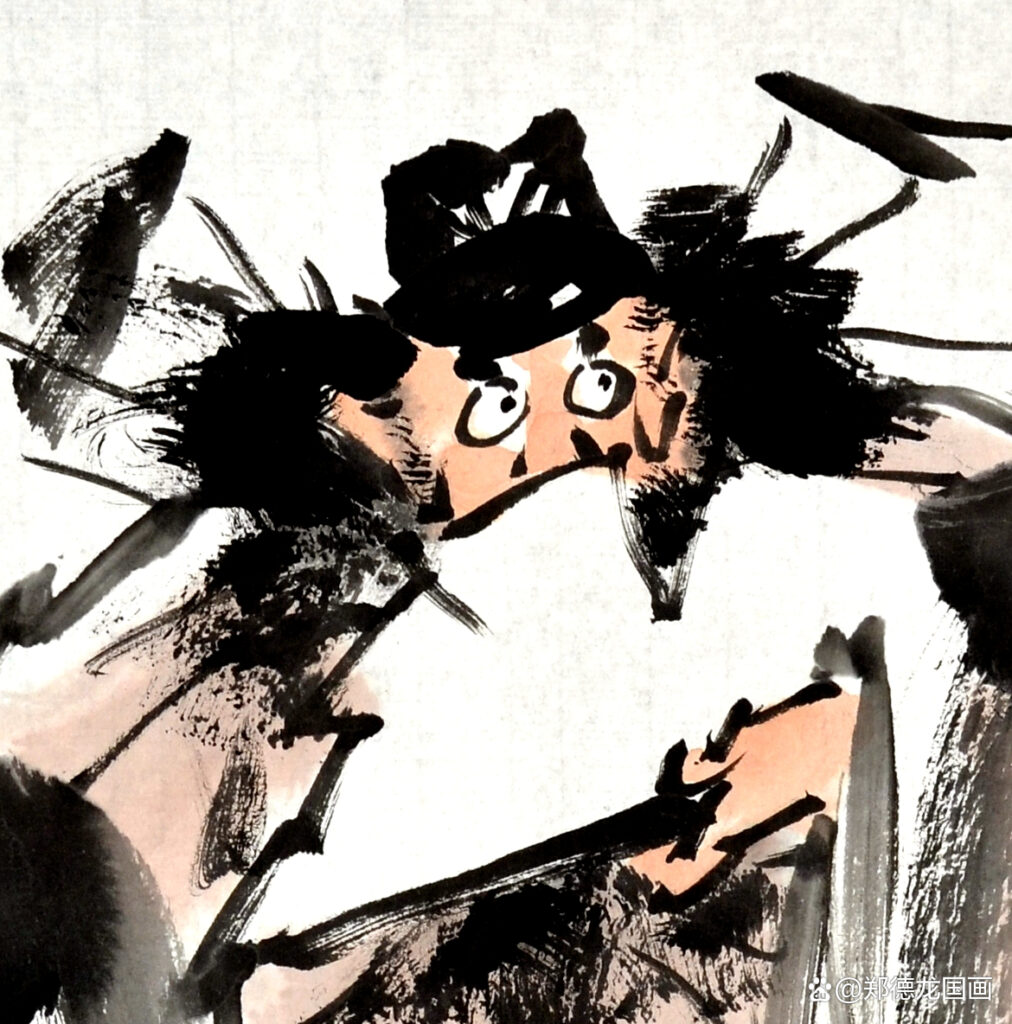
A Monkey King’s Journey to the East
Geremie R. Barmé
 The 13 January 1967 issue of Time magazine featured Mao Zedong on its cover with the headline ‘China in Chaos’. Fifty years later, Time made US president-elect Donald Trump its Man of The Year. With a ground-swell of mass support, both men rebelled against the established order in their respective countries and set about throwing the world into confusion. Both share an autocratic mind set, Mao Zedong as Chairman of the Chinese Communist Party, Donald Trump as Chairman of the Board. As Jiayang Fan noted in May 2016, both also share a taste for ‘polemical excess and xenophobic paranoia’.[1] For his part, Mao’s rebellion led to national catastrophe and untold human misery.
The 13 January 1967 issue of Time magazine featured Mao Zedong on its cover with the headline ‘China in Chaos’. Fifty years later, Time made US president-elect Donald Trump its Man of The Year. With a ground-swell of mass support, both men rebelled against the established order in their respective countries and set about throwing the world into confusion. Both share an autocratic mind set, Mao Zedong as Chairman of the Chinese Communist Party, Donald Trump as Chairman of the Board. As Jiayang Fan noted in May 2016, both also share a taste for ‘polemical excess and xenophobic paranoia’.[1] For his part, Mao’s rebellion led to national catastrophe and untold human misery.
On 20 January 2017, Donald Trump will be inaugurated as the forty-fifth president of the United States of America. Although some of China’s New Leftists hailed Trump’s November 2016 win as a validation of ever-victorious Mao Zedong Thought,[2] there is little reason to think that a Trump-led America will give much succour to China’s ideologues. In the two months since the US election, through a phone call to Taiwanese leader Tsai Ing-wen, repeated comments on China’s currency manipulation, the appointment of Peter Navarro (an economic hawk and author, among other things, of the 2011 book Death by China: Confronting the Dragon – A Global Call to Action) as director of the National Trade Council and his intervention in a dispute over a underwater US drone waylaid by the Chinese navy in the South China Sea, Trump has indicated that he is taking an unpredictable approach to the most important global bilateral relationship. Even long-standing friends and allies of the US have been thrown off guard as they learn how to live with the Great Disrupter.
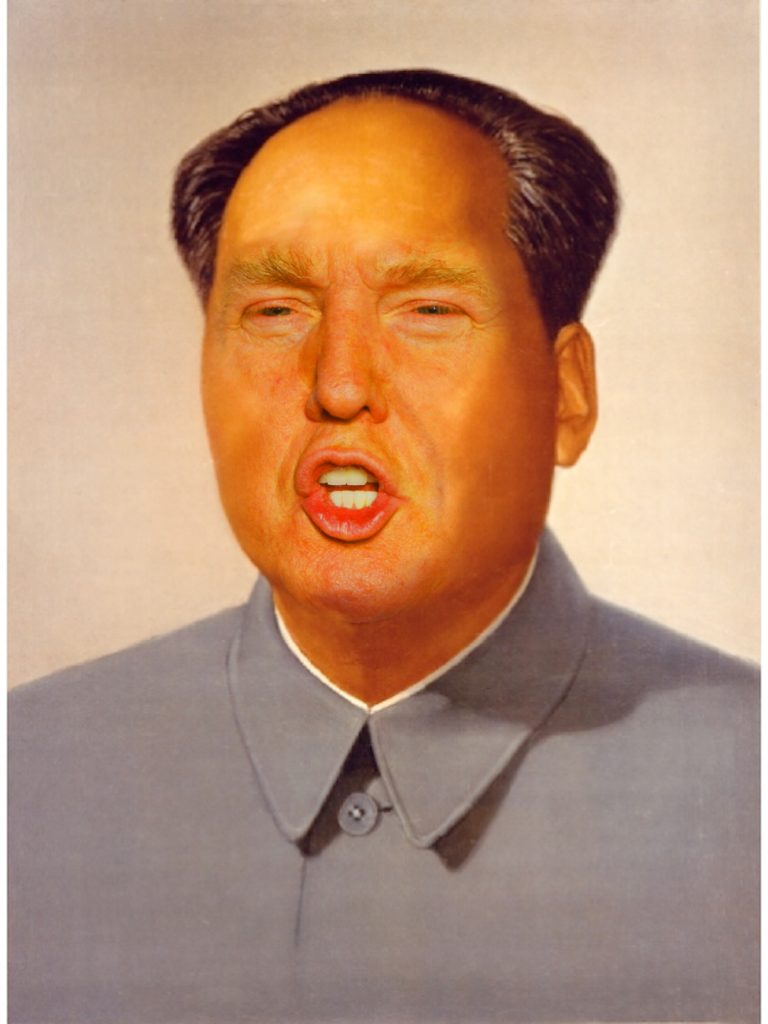
The Chinese Communist Party under its Chairman of Everything, Xi Jinping, hasn’t had to confront such an erratic and populist leader since Mao Zedong launched the Cultural Revolutionary fifty years ago.
Uproar in Heaven
In Official China the anniversary of the Cultural Revolution passed in silence, even though today’s People’s Republic, whether in terms of its achievements or of its egregious failures, continues to live in the shadow of that political maelstrom.
In 1966, Mao observed that his personality was a mixture of contradictory elements. There was the self-assured sense of destiny and confidence that led him to challenge and overturn earlier leaders of the Communist Party, confront Chiang Kai-shek and lead the Chinese revolution. This was, he said, an expression of his Tiger Spirit 虎氣, something that was in constant interplay with his Monkey Spirit 猴氣, one that was skittish, paranoid and unpredictable.[3] The Monkey was always ready to take on the Tiger with devilish glee. In the last two decades of his life, Mao’s China reflected this deep-seated contradiction as the country lurched between authoritarian control and anarchic confusion. What for the Great Helmsman was his life force writ large would rend the fabric of the society over which he ruled and threatened everything he had worked to achieve.
At the time of the Sino-Soviet split in 1961, Mao wrote a poem in praise of China’s most famous monkey, Sun Wukong 孫悟空, the hero of the popular late-Ming novel Journey to the West 西遊記 by Wu Cheng’en 吳承恩. The international order established following WWII was under increasing pressure and the Socialist Bloc led by the Soviet Union was riven by rebellion and disquiet as a result both of repressive Soviet expansionism in Europe and the ideological uncertainty generated by Nikita Khrushchev’s secret denunciation of Joseph Stalin in 1956.[4] Mao, giving vent to his Tiger Spirit, would now lay claim to the mantle of world revolution.
A thunderstorm burst over the earth, 一從大地起風雷
So a devil rose from a heap of white bones. 便有精生白骨堆。
The deluded monk was not beyond the light, 僧是愚氓猶可訓,
But the malignant demon must wreak havoc. 妖為鬼蜮必成災。
The Golden Monkey wrathfully swung his massive cudgel 金猴奮起千鈞棒,
And the jade-like firmament was cleared of dust. 玉宇澄清萬里埃。
Today, a miasmal mist once more rising, 今日歡呼孫大聖,
We hail Sun Wu-kung, the wonder-worker. 只緣妖霧又重來。[5]
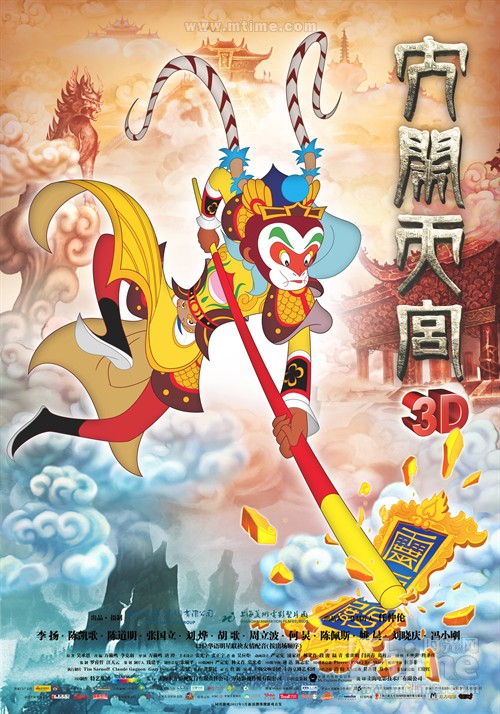
Having delivered this challenge, Mao’s unpredictable Monkey Spirit would attempt to turn the world upside down. His poem and Uproar in Heaven 大鬧天宮, a 1964 film adaptation of Wu Cheng’en’s novel,[6] struck a cord with the restive youth of China, many of whom closely followed China’s ideological contest with the Soviet Union. Like Mao, they too felt that their country was being stymied by a hidebound Soviet-style bureaucracy; the normalisation of the revolutionary ardour of the past was frustrating China’s ability to lead history and achieve greatness. They related to Mao as he portrayed himself as an outsider who championed an uprising of the masses against a sclerotic system.
When, in 1966, Mao both engineered and supported a grass-roots youthful rebellion against the very party-state he had created, a group of middle-school students in Beijing responded by composing a series of manifestos declaring that they, like Monkey, would support the Chairman, create an uproar in heaven and smash the old world to pieces. In particular, they proclaimed ‘Rebellion is Justified’ and quoted a line from Mao’s 1961 poem:
The Golden Monkey wrathfully swung his massive cudgel 金猴奮起千鈞棒,
And the jade-like firmament was cleared of dust. 玉宇澄清萬里埃。
Mao responded to the young rebels and, to use today’s parlance, an alt-left movement of radicalism was born. The students called themselves Red Guards.
In August 1966, Mao and his deputy Lin Biao encouraged the Red Guards to Destroy the Four Olds and a wave of iconoclasm swept the country while the violence against people victimised as representing the old order were denounced, attacked, beaten, and even killed. During what would be known as Bloody August, Mao is said to have written to Jiang Qing, his wife and partner in revolutionary extremism, declaring that ‘Once heaven is in great disorder a new kind of order can emerge’ 天下大亂達到天下大治.[7] He believed that throwing the political establishment and social order into confusion would liberate the true potential of people to achieve what was otherwise seemingly impossible. A high-tide of revolutionary enthusiasm would allow people to cast aside the deadening bureaucracy and revitalise industry, agriculture, research and society itself. Under the guidance of Mao Zedong Thought the goal of making China great again could be realised on the world stage.
The Instincts of an Autocrat
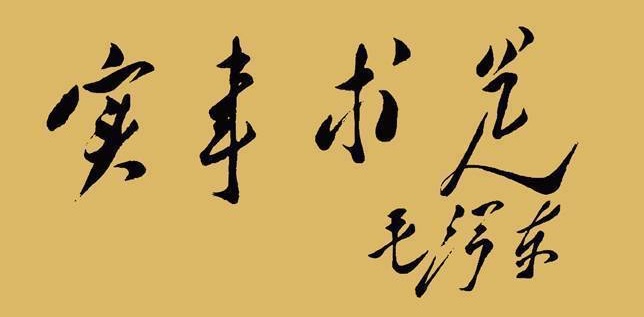
The similarities between Mao Zedong and Donald Trump don’t end with the autocrat’s mindset touched on in the opening paragraph of this essay, or with the clash between tiger-like brio and the dyspathy of the monkey. The will to autocracy means that both figures share (with elected or self-appointed strong men historically and worldwide) some disturbing parallels:
Quotations vs Tweets: In the Mao era the mysterious, contradictory and yet powerfully inciting utterances of the Chairman were conveyed not by Twitter, but through quotations broadcast over national radio and carried in the newspapers. In the print media Mao’s gnomic utterances were always highlighted by being printed in bold, while on radio they were recited in the stentorian voice of authority. A daily quotation called The Highest Directive 最高指示 featured in the top right-hand corner of the People’s Daily and was mimicked by every paper across the land. The quotations demanded a response and action and sent the country lurching in different directions while confusion reigned supreme in Beijing.
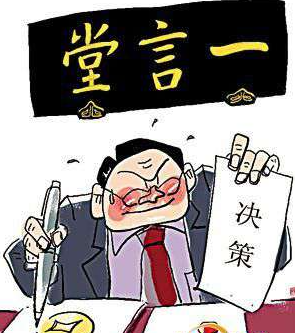
Progadanda vs the Lying Media: Like Mao, Trump has trouble sleeping and his early morning Tweets reveal whatever has caught the leader’s flickering attention, alerting the world to some new twist or turn in his feverish thinking. With Twitter Trump bypasses both the formal bureaucracy of Washington and what he and his followers dub ‘The Lying Media’.
Mao too distrusted the state media based in the capital Beijing and with the support of his wife Jiang Qing and her Shanghai comrades he got his message of rebellion out in other cities. He extolled The Right to Rebel and, in essence, he launched the Cultural Revolution to ‘drain the swamp’ of the Chinese party bureaucracy. He called enemies within the Party nomenklatura Capitalist Roaders, the permanent political class, that is men and women who were pursuing policies that undermined his ideas and which, he believe, held back China’s productive capacity and frustrated the country’s global revolutionary preeminence.
Climate Change vs Human Will: The effects of climate change and the mismanagement of natural resources were evident in Mao’s China: there was a profligate depletion of water resources; increasing desertification starting from Outer Mongolia; unmodulated industrial pollution from the Great Leap Forward era onwards; denial of contaminants in food and water supplies … the list goes on. Mao believed that ‘Man Can Conquer Heaven’ 人定勝天, that human will could triumph over nature. China now faces the challenge of climate change and environmental degradation with sober clarity; Trump’s America will be led by climate sceptics, deniers and those who would sign up for Mao’s axiom.
The Smartest Men in the Room: Like Trump, Mao thought he was ‘smart’ and he distrusted experts and the educated. An autodidact he believed that he did not need to rely on others to understand complex issues and resolve problems. He declared that the more education you have the more dangerous you may be.
Divide to Rule vs Scapegoating: Like Trump Mao pitted people against each other and encouraged discrimination against and the denigration of real and perceived enemies. He enjoyed the discomfort of others. His leadership style was erratic and even close allies never knew when they might be found wanting or discover that they had been betrayed. Mao didn’t need to say ‘You’re Fired!’ for his victims learned of their fate at the hands of underlings or in the media. Despite a belief in his omniscience and a sense that he alone understood mass sentiment, sequestered behind high palace walls, Mao lived in constant fear of machinations against him. His physician Zhisui Li claimed that in his later years, Mao anxiously questioned visitors: ‘What news do you have?’ 有甚麼消息? His paranoia led him to detect new plots and hidden enemies. Conspiracy theory became the core of Mao Zedong Thought. His response to his own suspicions was to create an atmosphere of unease and constant uncertainty.
A touch of yin, a touch of yang,
That is the nature of the Tao.
A swerve to the left, a swerve to the right,
This is the way of Mao.
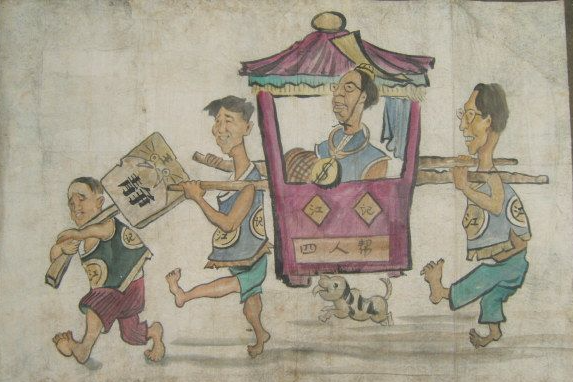
Gangs of Four: Mao’s inner circle was the infamous Gang of Four. Donald Trump has his own Gang of Four: the canny female enabler, Ivanka Trump; the ‘Dog-head General’ 狗頭軍師, Steve Bannon, formerly of Breitbart News; the loyal propagandist Kellyanne Conway, a genius at dialectical argumentation; and, the helicoptered-in successor-in-waiting, Jared Kushner.[8] When the farrago of Trump’s rule comes to an end, will they too end up in the dock like the original Gang of Four, or will they, like most things in America — homeland of the makeover and comeback — merely march forward, from victory to victory?
Business as Usual: In the long run, Mao found he had to rely on the old state bureaucracy, as well as those who knew how to run it, to keep the country functioning. After 1971, he brought back into power Deng Xiaoping (no, Zhou Enlai was not behind this reluctant move), a man denounced only five years earlier as China’s Second Greatest Capitalist Roader. Mao needed Deng to rebuild institutions and get the country working again. But even as the civilian economy slid towards ruination, Mao knew to keep the army on side and although, like Trump, he disparaged intelligence, he talked freely of the power of the A-bomb and brandished nuclear weapons to cow enemies.
Living Mao Thought
Some writers in China’s contemporary alt-left have identified in Trump’s winning electoral strategy elements of Mao Zedong Thought and, in so doing, they remind us of the malleability of Mao’s dialectical magical thinking, the questionable history of this ginned up Chinese political tradition (to which Xi Jinping doggedly cleaves) and the cracked mirror in which such commentators see distorted reflections of themselves. As one writer in a mood of triumphalist irony put it:
First, Trump’s Great Leap Forward-style declaration of his net worth was a validation of Mao Zedong’s dictum ‘Seek Truth from Facts’ 實事求是. In so doing and by ‘telling it like it really is’ Trump flew in the face of US political wisdom and reached out directly to the broad masses of people, overturning years of oppressive political correctness in the process.
Secondly, in his approach to America’s economic woes Trump has followed what in Maoist terms is a Mass Line 群眾路線. The author quotes Mao:
‘What’s politics? Politics is how you massively increase the number of people who support you while reducing the number of your enemies to the maximum extent’. 政治是什么?政治就是把拥护支持自己的人搞得多多的,把敌人搞得少少的。
And, finally, it is Trump’s own financial independence and self-sufficiency 獨立自主 that have allowed him to ignore major political donors and the Washington money machine, relying instead on his personal fortune. The article ends with a quotation from Mao Zedong’s famous parable about the Foolish Old Man Who Moved the Mountain 愚公移山 suggesting that Trumpism can achieve its aims not only through the efforts of Trump himself, but by future generations of his family. At this point in the article the author inserts a picture of a bikini-wearing, oiled up and glistening Ivanka Trump from a Harper’s Bazaar cover. He finishes his argument by making a plea to the new president: on his first official visit to China he should bring his children with him.[9]
Post-truth China
On 1 April, April Fool’s Day, 1969, the Chinese Communist Party convened its Ninth Party Congress and declared that the Cultural Revolution had come to a victorious end. In reality, the rule of Mao’s radicals extended beyond both his death in September 1976, and the arrest of the Gang of Four the following month. It was only with the Third Plenum of the Eleventh Party Congress in December 1978 that the policies of the Mao era were repudiated, even though his shade would linger far into the future.[10] It is hard to say how long Trump’s presidency will last, but there is little doubt that its effects will also long outlive him.
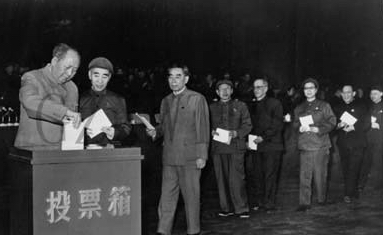
Since its founding in 1949, the People’s Republic of China has lived in a post-truth bubble. With its guided media and vast propaganda-industrial complex the Party maintains its rule over facts with relentless vigilance. The neo-liberal West has, from the days of the Reagan-Thatcher duumvirate, increasingly relied not merely on economic growth, but also on the distortion of reality to bolster its hold over consumer’s hearts-and-minds. We have lived into an age in which the Lying East and the Lying West are reaching a new kind of equilibrium. Some call this not-cold, not-hot war a chilly war of ideologies, a 涼戰, or at least of vested interests. It has created a face off of like-against-like and, for students of the political and cultural dilemmas of the twentieth-century it provides a harrowing lesson in real-time politics.[11]
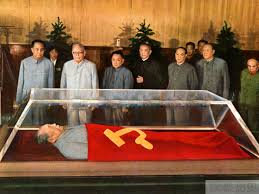
The Chinese had to wait for biological attrition to resolve the problem of Chairman Mao, and still his waxen corpse lies in the heart of Tiananmen Square. We are already led to speculate whether, ‘After One Hundred Years’ 百歲之後, as the Chinese euphemistically call death, will the embalmed body of Trump, that Tangerine Caligula, hair in a preternatural combover, be put on display in his New York faux-Louis-XIV penthouse or at Mar-a-Lago, Trump’s ‘Mediterranean-style’ resort in Florida?
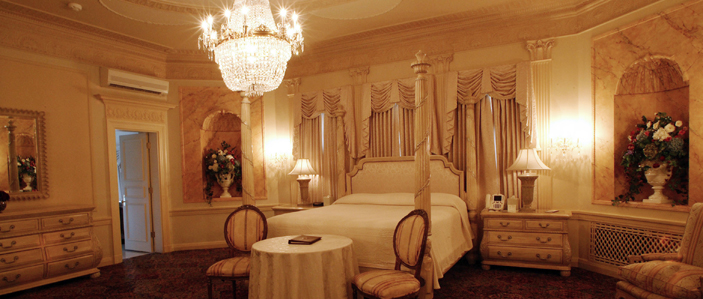
For long years America’s Republicans have worked to make their nation ungovernable and through their actions they have given proof to the lie that government is always inefficient, interfering and incompetent. Along with a media long ago identified by Neil Postman as one that aims to Amuse Us to Death, they have generated distrust in government and the public good for rank political advantage.
The Golden Monkey Unleashed
As we noted in the above, the advent of Donald Trump as US president confronts China’s party-state bureaucrats with an erratic and capricious leader of a kind they haven’t had to deal with since Mao died forty years ago. Trump’s presidency may give them an opportunity to show that they can be the more mature and stable partner in the Sino-US relationship. However, given the leaden responses China’s party-state leaders offer in times of crisis and chaos in China, let alone internationally, there is little reason to believe that while they might be quick to demonstrate a preening and boastful Tiger Spirit in denouncing President Trump, they may easily be wrong-footed by that devil-may-care Monkey.
For popular Chinese commentators and the nation’s cynics — furious men and women cowed and domesticated by a paternalistic system that at every turn reinforces their political impotence — Trump’s victory is a boon, a new source for anti-US Schadenfreude. It offers further evidence of the bankruptcy of Western-style politics and proof that we are in an era of illiberal democracy, one in which China’s sham multi-party system and farrago about basic human rights are trumpeted by the official media and the bullish propagandists at The Global Times.
What is significant for readers of China Heritage is that Donald Trump’s presidency augurs a dark future for public information, understanding and ‘truthiness’ in how people think about and engage with the Chinese Commonwealth. Meanwhile, over the past four years, Chairman of Everything Xi Jinping’s dolorous rule in Beijing has revived memories of Silent China 無聲的中國, making that country once more an open secret: superficially easy to gain access to but one in which all serious, non-commercial and creative interactions are once more heavily policed by the guiding hand and deadening censorship of the Party.[12]
In the USA, the escalating clamour of factional politics and media hysteria may well, as it has so often in the history of China over the last century, marginalise and suppress moderate, considered opinion. This will only further humanity’s move towards a new Age of Extremes. This will inescapably require us all to confront an unfinished twentieth century.
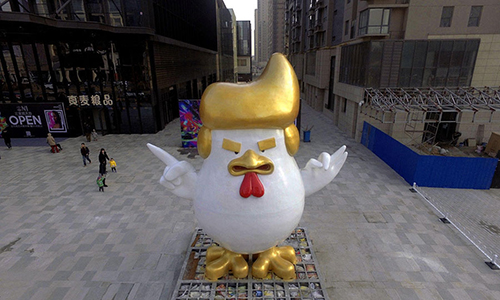
***
Postscript, 12 January 2017: As one reader of this essay remarked: ‘From Golden Monkey to Golden Showers in just over a week.’
***
Notes
The title of this short essay obviously ‘gestures’ towards Wu Cheng’en’s Journey to the West, but it is actually a reference to Herman Hesse’s 1932 novel Die Morgenlandfahrt (Journey to the East).
[1] Jiayang Fan, ‘The Maoism of Donald Trump’, The New Yorker, 13 May 2016.
[2] See ‘特朗普当选是毛泽东思想的胜利’, 15 November 2016.
[3] Mao Zedong, ‘Letter to Jiang Qing’ 寫給江青的信, 8 July 1966. This letter is highly problematic. No original version of the letter survives (Jiang Qing would later claim that she burned it); and the text wasn’t published until after the sudden demise of Mao’s hand-picked successor Lin Biao in September 1971. The mystery surrounding this elusive epistle will be the subject of a future essay in China Heritage.
[4] Nikita Khrushchev, ‘Speech to the 20th Congress of the C.P.S.U.’, 24-25 February 1956. See also ‘On the Cult of Personality and Its Consequences’.
[5] Reply to Comrade Kuo Mo-jo, 七律·和郭沫若同志 Inscription on a Picture Taken by Comrade Li Chin — a lu shih, 17 November 1961. This is the official English translation of the poem, published in 1976 by the Foreign Languages Press in Peking.
[6] ‘Uproar in Heaven’ 大鬧天宮, 1961-1964.
[7] Letter to Jiang Qing, see Note 3 above.
[8] The original Gang of Four, or the ‘Anti-Party Clique of Wang Hongwen (the handsome Shanghai worker agitator was “helicoptered in” 坐直升飛機進中央 by Mao to become a future leader), Zhang Chunqiao (the “Dog-headed General” 狗頭軍師 and radical theorist who first came to prominence in the late 1950s), Jiang Qing (Mao’s wife and putative great-leader-in-waiting) and Yao Wenyuan (propagandist and poisoned-pen hack)’ 王張江姚反黨集團, is a shorthand for a large group of Maoists, including the fifth, and lead, member of the gang, Mao Zedong himself. Following Mao’s death on 9 September 1976, the Gang was said to have been planning a take-over of the party-state or, in the language of the time, 篡黨奪權. They were supposedly set on dividing up the spoils of power with Jiang Qing slated to be Party chairperson/ chairwoman, Zhang Chunqiao would-be premier, Yao Wenyuan Party vice-chairman and Wang Hongwen as head of the National People’s Congress.
[9] ‘特朗普当选:毛泽东思想的伟大胜利’, 9 November 2016.
[10] The year 2016 was one replete in anniversaries. Among many others it also marked two decades since Shades of Mao: the posthumous cult of the great leader, my study of the abiding spirit of Mao Zedong in Chinese life, was published.
[11] See Adam Curtis’ documentary Hypernormalisation, released by the BBC on 16 October 2016. The film is inspired by observations made by Alexei Yurchak in his 2006 book Everything was Forever, Until it was No More: The Last Soviet Generation on the paradoxes and untruths of the last decades of Soviet socialism.
[12] See my ‘Living with Xi Dada’s China — Making Choices and Cutting Deals’, a keynote address presented at the conference ‘Political Enchantments: Aesthetic practices and the Chinese state’, Melbourne, 15 December 2016. The video and text of the speech are published on this site, see: Cutting a Deal with China, China Heritage, 20 July 2017.
***


